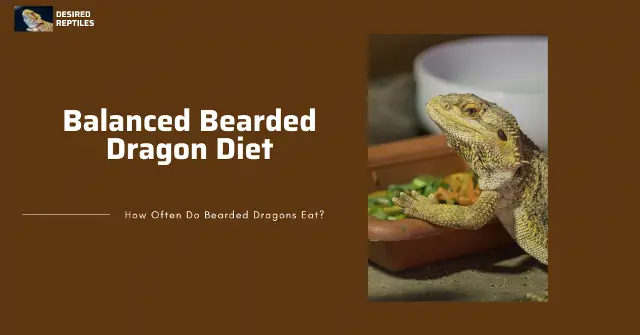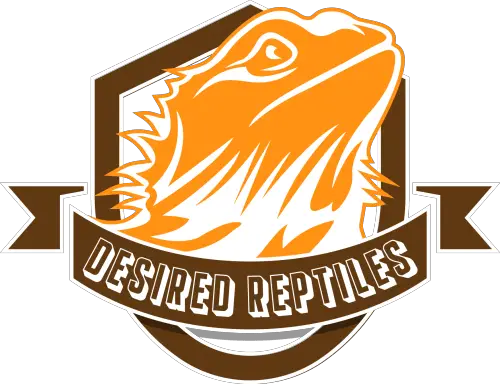Keeping a bearded dragon is entirely different from having cats, dogs, or other non-exotic, adorable, and fuzzy friends. A lot of consideration and patience is required to ensure that your exotic pet eats healthy and proper meals. Whether you’re planning to adopt a beardie or you have just brought one home, the feeding routine easily becomes the most crucial aspect of your journey together, right after setting up the enclosure.
Bearded dragons eat according to their age. For instance, baby beardies eat 3 to 5 times a day, juveniles eat 2 to 3 times, and adults eat once daily, all with a specific balance of protein and veggies necessary for their growth and well-being.
In this article, I will guide you on how often you should feed your beardie and how to provide them with the best diet for a healthy lifestyle. Read on!

What Does A Good Bearded Dragon Diet Look Like? 3 Major Ingredients
Wrong food choices are even worse than incorrectly rationing the feed. For instance, did you know that your dragon could die from eating fireflies or having little to no calcium?
The proper beardie diet comprises the necessary percentage of protein, minerals, and vitamins. Again, it’s never one size fits all. Bearded dragons at different stages of their lives require different diet compositions to stay healthy and happy. As simple as this may sound, it’s a crucial step in caring for your dragon.
Protein (Grubs)
The protein sources for bearded dragons majorly come from grubs and small rodents, and constitute other values such as fat, water, and mineral content. It’s important to understand the value of protein so that you can apprehend how it affects your dragon at specific phases. For instance, baby beardies and juveniles do better with high-protein food in comparison to pre-adult and adult beardies since they are constantly building muscles during their growth.
However, you must beware of fatty protein sources such as wax worms. They specifically are not recommended as a staple source of protein because of the high levels of blubber. So, they should be introduced at weekly intervals, or especially for recovering beardies to help them put on healthy weight.
I have tabled 7 well-known protein sources and their content in percentage to help you weigh and understand your options better.
| PROTEIN SOURCE | FAT % | ACTUAL PROTEIN % | WATER % |
|---|---|---|---|
| Mealworms | 15 | 20 | 65 |
| SilkWorms | 20 | 21.5 | 55.5 |
| Wax Worms | 25 | 15 | 60 |
| Super Worms | 13 | 20 | 57 |
| Roaches | 10 | 20 | 70 |
| Crickets | 7 | 21 | 72 |
Minerals (Vegetables)
Vegetables are highly important for your bearded dragon’s growth. They contain significant minerals that assist in the metabolism and restructuring of your pet’s cells and muscles as a whole. It’s highly vital to maintain a healthy mix of protein and minerals so that your pet isn’t easily susceptible to illnesses.
Here is a good list of dragon-worthy greens:
- Kale
- Mustard greens
- Carrots
- Eggplant
- Asparagus
- Turnip greens
- Dandelion greens
Avoid light-colored or watery veggies like lettuce as it may cause your dragon periods of diarrhea. Instead, make a beeline for dark-colored, chlorophyll-saturated, or flavonoid-rich vegetables for the best and safest results.
Supplementary Minerals And Vitamins
This category contains calcium, iron, vitamin C, and vitamin D, which are important minerals for the well-being of your dragon. Reptile-safe calcium or iron powder should be sprinkled on their food before consumption, vit C can be obtained from gut-loading worms with citrus fruits, and short walks in the sun will provide good doses of vitamin D. These three factors work together to prevent your dragon from suffering from growth deformities and illness as they grow.
Deterring growth abnormalities is another reason why the UVB lamp is crucial (view on Amazon) as it provides a constant supply of vitamin D for your pets. Don’t fall for that shabby scam where “experts” claim that UV lights are just the same as UVB! UV lights are completely distinct from UVB and will not provide your dragon with the benefits of basking and gaining vitamin D.

A Healthy Bearded Dragon Feeding Frequency
The regularity of feeding for beardies is determined by their age. Bearded dragons have different stomach capacities and nutritional needs for every stage of their development. So, you must provide suitable feeding plans based on the age of your bearded dragon.
0 to 3 Months Old (Hatchlings)
If your bearded dragon falls into this age group, it’s still a baby and will eat voraciously! During this phase, they eat 3 to 5 times a day and appear to be insatiable. Baby dragons need a substantial amount of protein for them to put on the considerable weight required for their health. In essence, this stage features rapid growth and cell development, both of which are central demands for more proteins than veggies.
3 to 6 Months Old (Juveniles)
Juvenile dragons are still categorized as baby dragons and maintain the same feeding frequency. At this stage, they are still maturing into adulthood and are more active than hatchlings. They will scurry and run around their tank with the energy they get from their diet all day, which is why they need to be fed regularly. Similar to baby beardies, juveniles should eat 3 to 5 times daily.
6 to 9 Months Old (Pre-Adult)
If you’ve been keeping up with the insane feeding routines of juvenile bearded dragons, you can pull the reins a bit at 6 to 9 months of age. At this stage, their metabolism begins to slow down, and the need for more than 3 squares of grubs and veggies fades away, reducing the feeding frequency to 2 to 3 times a day.
9 Months to 1+ Years Old (Adult)
At this stage, you can feed your dragon a proper diet once a day. Adult bearded dragons have a much slower metabolism in comparison to younger beardies. This is also the period they tend to be more docile and thus, burn less fat. Significant protein isn’t a requirement for them at this juncture. They’d be more interested in eating greens, trying to lock a good level of moisture in, and finding the best basking spot.
The table below describes briefly how to ration your pet dragon’s feeder veggies and bugs according to their age.
Diet For Feeding A Sick Or Recovering Bearded Dragon
Recovering or sick dragons need sufficient vitamins and minerals to properly fight against illness. Include high-calcium vegetables like collard greens and spinach and a few proteinous worms to rejuvenate your recovering pet. Also, prioritize taking short walks in the sun as a source of vitamin D to revive your dragon much faster. While the UVB light provides a constant supply, your pet will benefit from a quick boost of vitamin D from the natural source.
However, during this period, you must pay proper visits to the vet for a valid diagnosis and treatment. The measures listed above are simply ways to speed up your dragon’s recovery process; they are not an option or method of treatment.
Commonly Asked Questions
Is a supplement-free diet enough to sustain a bearded dragon in captivity?
Bearded dragons can develop certain illnesses when they are in captivity, even when they are fed a decent diet. Calcium and vitamin deficiencies are quite common for pet beardies and as such, vitamin supplements can go a long way to aid your commendable efforts in keeping your beardie healthy. However, they are only supplemental to their main diet and must not be relied on for your pet’s entire well-being.
Do bearded dragons hate fruit?
Beardies do not care too much for fruits. Since they originate from arid regions, their taste buds are not quite evolved to find fruits delicious. However, they seem to tolerate berries particularly.
How do I know if I’m overfeeding my dragon?
If your beardie is overfed, it will vomit some of its food to relieve itself. Bearded dragons are habitual for leaving little clumps of vomited food and sometimes even going back to eat them. You may find these clumps and think the meal was indigestible, but that’s just your overfed dragon easing itself for more food.
What insects are dangerous for beardies?
Butterflies and other insects that tend to glow in the dark are harmful to your beardie. The chemical responsible for this admirable feature in the bug is detrimental to the life of your dragon. So, do not let them eat or actively feed them any of these insects.
